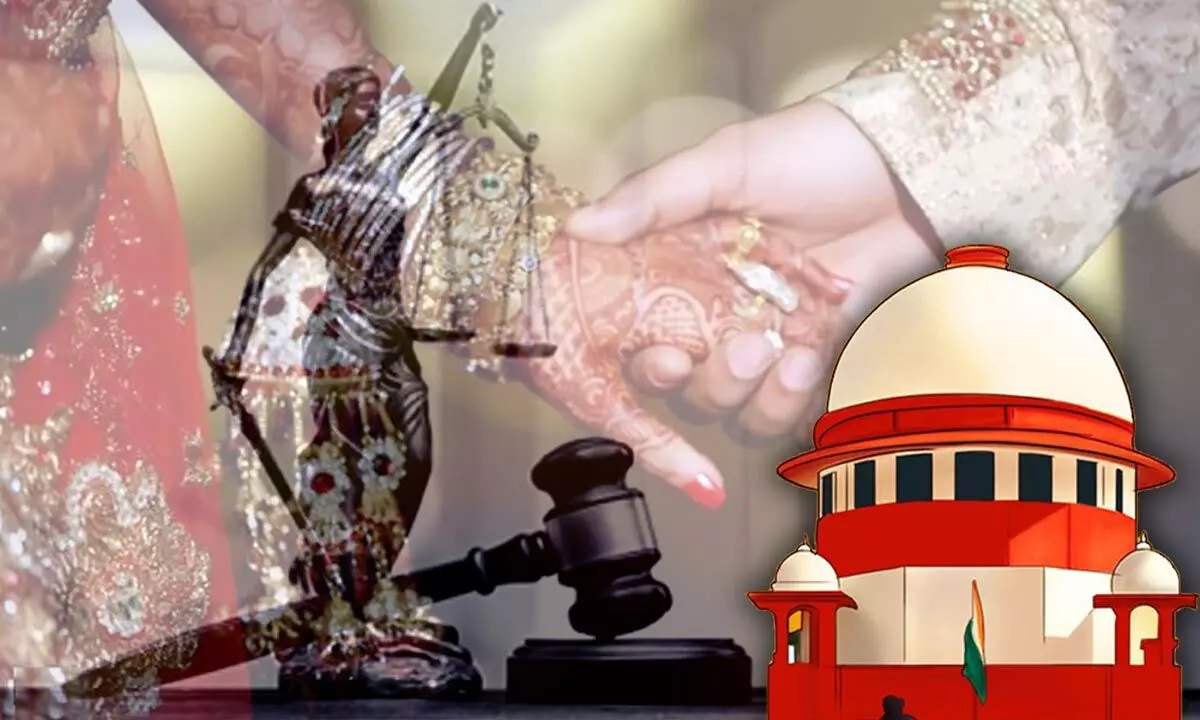Supreme Court to hear on Jan 2 pleas challenging state laws regulating conversions due to inter-faith marriage

For representational purpose
The Supreme Court is scheduled to hear on January 2 a batch of pleas challenging controversial state laws regulating religious conversions due to interfaith marriage.
New Delhi: The Supreme Court is scheduled to hear on January 2 a batch of pleas challenging controversial state laws regulating religious conversions due to interfaith marriage.
A bench of Chief Justice DY Chandrachud and Justice PS Narasimha is scheduled to hear the PILs filed by advocate Vishal Thakre and an NGO 'Citizens for Justice and Peace'. The Supreme Court will also hear a plea by Muslim body 'Jamiat Ulama-I-Hind' which it had allowed last year to become a party to the petitions as it claimed a large number of Muslims are being harassed under these laws across the country.
As per the office report uploaded on the apex court website, so far no reply has been filed by the Centre or any of the states which have been made parties to the litigation. On February 17, 2021, the top court had permitted the NGO to make Himachal Pradesh and Madhya Pradesh the parties to its pending petition by which it had challenged some controversial state laws regulating conversions due to interfaith marriages. The apex court had on January 6, 2021 agreed to examine certain controversial new laws of Uttar Pradesh and Uttarakhand regulating religious conversions due to such marriages.
It had, however, refused to stay the controversial provisions of the laws and issued notices to both the state governments (Himachal Pradesh and Madhya Pradesh) on the petitions. The pleas, filed by Thakre and the NGO, have challenged the Constitutional validity of the Uttar Pradesh Prohibition of Unlawful Religious Conversion Ordinance, 2020 and the Uttarakhand Freedom of Religion Act, 2018 which regulate religious conversion of people in interfaith marriages. The NGO had submitted during the last hearing that both Himachal Pradesh and Madhya Pradesh should be made parties to its plea as they have also framed laws on the lines of Uttar Pradesh and Uttarakhand.
The controversial UP ordinance relates to not only interfaith marriages but all religious conversions and lays down elaborate procedures for any person who wishes to convert to another religion. The Uttarakhand law entails a two-year jail term to any person or persons found guilty of religious conversion through "force or allurement". The allurement can be in cash, employment, or material benefit. Thakre and others have said in their plea they are aggrieved by the ordinance which curtails the fundamental rights of the citizens of India provided under the Constitution. The plea said the laws passed by Uttar Pradesh and Uttarakhand against 'Love Jihad' and punishments thereof may be declared ultra vires and null and void because they disturb the basic structure of the Constitution as laid down by the law.
It claimed they are against public policy and society at large. The plea filed by the NGO alleged the legislations violate Articles 21 and 25, as they empower the state to suppress an individual's personal liberty and the freedom to practice religion of one's choice. Jamiat Ulama-I-Hind, in its application filed through advocate Ejaj Maqbool, raises the issue of fundamental rights of the Muslim youth who are being allegedly targeted and demonised by using the impugned ordinance which in itself is unconstitutional being violative of Articles 14, 21 and 25.

